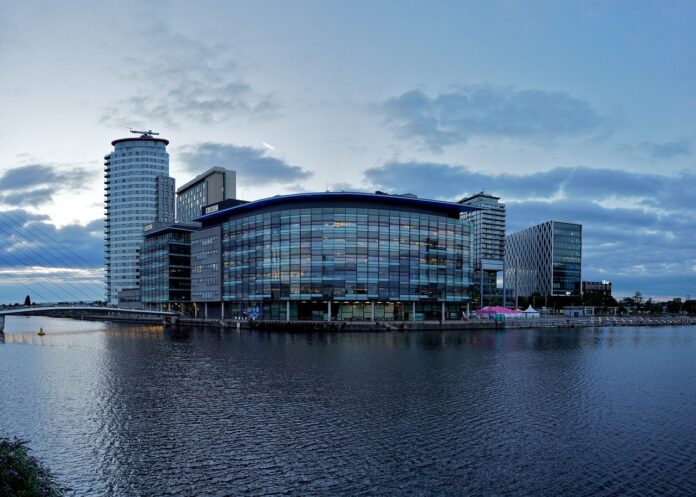The UK faced an extraordinary contraction in their economy during the peak of the pandemic in 2020, and has since seen an imbalance in how it’s recovering. Not only is the stock market seeing a V-shaped curve, but regions are recovering differently too.
Manchester appears to be one of the lucky ones, though, in which growth is picking up. Currently, Manchester appears to be a city that’s in a unique stage of development – it’s a fully fledged city that is perhaps the closest thing to London besides possibly Birmingham. With a £62.8bn economy, the city is certainly a powerhouse.
However, unlike London, house prices remain affordable. The average semi-detached house is selling for around £251,000 in Manchester, whilst a detached house in London averages a million.
This discrepancy is vast. It is then no surprise that Hong Kongers are snapping up cheap Manchester homes, in a city with a large economy and room for growth. Of course, the pound has been strengthening over the past year against the HKD, so it may also be down to the growing industry of accessible money transfers that’s also facilitating this trend.
The growing pound, whilst initially making property more costly for FDI, is also another attraction for the likes of manchester. Since Brexit became a formality, speculation died down, which seems to have helped the pound’s volatility. It could be argued that since 2016, it was undervalued due to the threat of the worse possible Brexit deal. Whilst it’s a contentious deal, it has brought more certainty – which is the enemy of volatility. Because of this, great investments in places like Manchester are back on the table.
Manchester actually attracts the most FDI in the UK besides London, and has very strong inward investment. In fact, £231 GVA was generated from the 3,458 jobs that were created in 2019.
A bright future for Manchester
Manchester is being dubbed to ‘build back better’ by the Prime Minister, in part because it isn’t overly reliant on just one or two sectors. Manchester is instead a well diversified city that has growing tech, media and property sectors that have limited the damage from Covid-19 lockdowns.
The CEO of Magnetic North design studio, Ms Cordell, states “We absolutely see this as a reset moment. Our economic vision talks about getting out on the other side of this and moving onto something better – that works better for people and works better for the planet. That means not going back to the way things were.”
The strong spirited business community mixed with the history and strength of being the ‘original modern city’, bodes well moving forward. Furthermore, Manchester spent significantly more time in lockdown than many other cities. This can be interpreted as having more distance to rebound of course, and also shows the strength of the businesses that survived. In a perhaps harsh metaphor: like the virus itself, the businesses are stronger because the weaker ones were removed. From here, we will see more businesses being started during the recovery phase.
It’s also the geographical proximity of Manchester that can put forward the argument that Manchester has plenty more growth left too. For example, it is within a short commute away from Sheffield, Leeds, and Liverpool – all of which are either industrial powerhouses or strong, growing economies.
Within an hour’s drive of Manchester, over 7 million people are residents. Manchester itself has a population of almost 600,000, and is also set to increase by another 56,000 by 2034 – almost 10%. This is one of the main factors that drives not just economic growth but property prices.
There is an issue of underdeveloped rail infrastructure between them, meaning that the cities cannot synergise between each other and share resources more efficiently. This, however, stands a good chance of improving once the potential is realised – particularly with the Transpennine Route Upgrade announced to boost Greater Manchester’s rail with Yorkshire. Whilst this will lead to a 16-day railway closure, the developments are absolutely necessary and welcomed.
The involvement of money transfer companies in growth
As touched on earlier, money transfer companies are helping reduce the friction between currency exchanges by offering low-cost, fast transactions. Companies like MoneyCorp, as seen by 3,000 independent reviews, are making it very easy to purchase overseas property – which has certainly been a contributing factor in Manchester’s growing FDI.
It’s not just foreign investors that benefit from this cheap access to currency though, it’s small businesses. Due to the trend towards remote workers, many companies within Manchester and all around the UK will have set up a remote work flow, where employees have skipped the office and instead opted to work from home.
Of course, this makes recruiting overseas freelancers and remote workers much more familiar, and this is when money transfer companies become crucially important. Payments have consistent margins, transfers are fast, and hedges can be made to mitigate currency risk. This also comes in handy when purchasing from suppliers from abroad, too.
As businesses are set for their bounce back, or are just starting up looking to ride the wave of reflation, currency and diversification will play an important role – more so than pre-pandemic. Manchester was rewarded for its diversification, unlike many northern towns, and this will stick in the memory of small firms – to always be prepared for alternative revenue streams when faced with a crisis.







